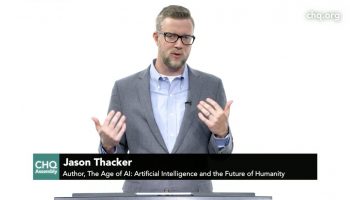“Should I Stay or Should I Go” is more than just a song by the Clash; it also neatly summarizes the debate about the United States starting and ending stay-at-home directives.

For Jason Thacker, who writes and speaks on issues including human dignity, ethics, technology and artificial intelligence, the decision to stay home was easy. Dorie, Thacker’s wife, was diagnosed with Hodgkin’s lymphoma last fall and had just finished chemotherapy, so their family isolated at home well in advance of the U.S. government’s stay-at-home directives for her safety. But Thacker said that in addition to public health dilemmas, a larger debate due to COVID-19 was the use of tracking technology to protect human life while also giving up privacy.
“When humans try to be all-knowing — without the love and sacrifice God perfectly demonstrates — it leads to trouble,” Thacker wrote for The Gospel Coalition.
Thacker will deliver his lecture, “The Age of AI: Artificial Intelligence and the Future of Humanity,” on his book of the same name, at 2 p.m. EDT on Tuesday, July 21, on the CHQ Assembly Video Platform as part of the Week Four Interfaith Lecture Series theme, “Ethics in a Technologically Transforming World?”
Thacker serves as Chair of Research in Technology Ethics at The Ethics and Religious Liberty Commission of the Southern Baptist Convention. He holds a Master of Divinity from The Southern Baptist Theological Seminary and is now pursuing a Ph.D. in Ethics and Public Theology at the seminary.
“We are delighted to welcome Jason Thacker to this week’s important conversation on the question of ethics, in this world in which technology is changing almost every aspect of our lives, here and globally,” said Director of Religion Maureen Rovegno. “Jason will address the possibility of how and why technology could eventually call into question our very humanity, and he will do it through a religious-ethical lens and voice that will give depth and relevance to the conversation for so many of our audience participants.”
Thacker’s work has been featured at Christianity Today, The Gospel Coalition, Slate and Politico, in addition to his articles on the ERLC site. In the last few months, he has concentrated on how the COVID-19 pandemic is a new factor in his sphere of work.
“Even as COVID-19 brought some national unity, we are beginning to see the fraying of American society once again,” Thacker wrote in April. “Political, social, economic and religious issues have sorted us into tribes and tribes of tribes. It is difficult to keep up to date on the number of differing viewpoints and interest groups. But there is one concern that seems to bring the fraying parties and purported enemies together: the power and influence of technology on our lives.”
The value of personal data grows every year, and has become more valuable than the price of oil in the last few years.
In 2019, Thacker called for the ERLC to create a public statement of principles for artificial intelligence, which he contributed to later that year. Thacker said that overreaches in artificial intelligence technology, for the sake of short-term but serious public health or safety concerns, can create worse privacy and security issues in the future.
“AI is everywhere in our society and is often working behind the scenes,” Thacker wrote. “As Christians, we need to be prepared with a framework to navigate the difficult ethical and moral issues surrounding AI use and development. This framework doesn’t come from corporations or government because they are not the ultimate authority on dignity issues and the church doesn’t take its cues from culture.”
This program is made possible by “The Lincoln Ethics Series,” funded by the David and Joan Lincoln Family Fund for Applied Ethics & the Carnahan-Jackson Religious Lectureship.




